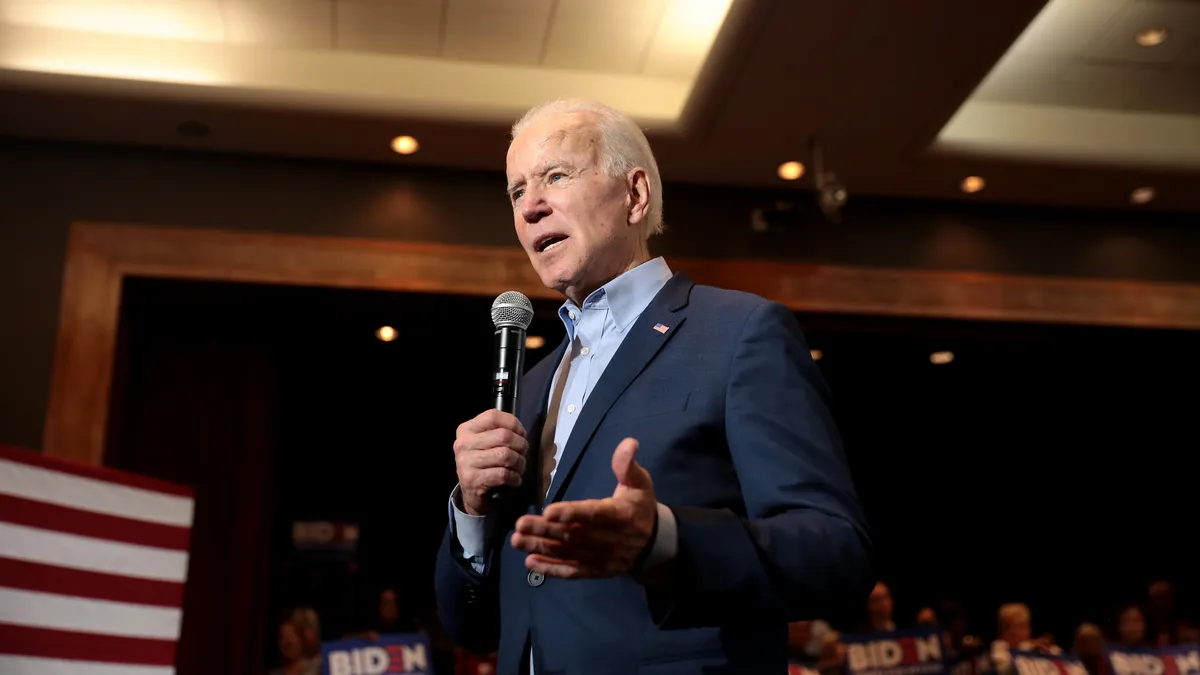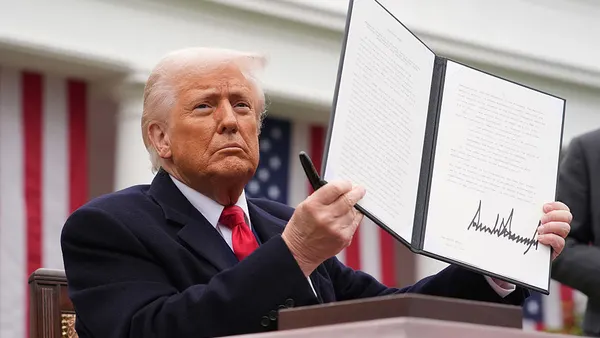Dive Brief:
- Former VP Joe Biden's presidential campaign released a plan to improve supply chains critical to the U.S. battle against the coronavirus Tuesday, pledging to "immediately marshal all of the tools of the Federal government to secure sufficient supplies, treatments, and, as soon as possible, a vaccine to combat the pandemic," if elected.
- The plan ties together tax policy, trade policy and executive action to support a state of readiness Biden claims will better prepare the U.S. for future crises. "Where necessary to protect critical infrastructure and supplies, he will impose targeted restrictions on imports from nations such as China and Russia that pose national security threats," reads the plan, which also calls for a periodic review of U.S. supply chain vulnerabilities — similar to military supply chain review processes — mandated by executive order and eventually put into law.
- Biden's plan also states the need for "a stronger, more resilient domestic supply chain in a number of areas, including energy and grid resilience technologies, semiconductors, key electronics and related technologies, telecommunications infrastructure, and key raw materials." The campaign said a plan addressing support for U.S. manufacturing is coming soon and proposes a "Critical Supply Chains Workforce Development Fund" to invest in skills training for workers critical to these manufacturing sectors.
Dive Insight:
With this plan, Biden positions supply chains as a matter of national security and an issue in the November election.
President Donald Trump has made multiple calls for increasing domestic manufacturing across industries and emphasized refilling the Strategic National Stockpile (SNS). He invoked the Defense Production Act (DPA) in March, but repeatedly stated he had not needed to use it often since U.S. manufacturers came to the table willingly to improve shortages of N95 respirators, ventilators and other supplies.
On the issue of domestic production, Trump and Biden are aligned at least in rhetoric. PPE and vaccine components are largely made outside the U.S. — more than 80% when it comes to active pharmaceutical ingredients for vaccines. Both 2020 candidates call for these supply chains move closer to home.
Rick Bright, the former director of the Biomedical Advanced Research and Development Authority (BARDA) in a whistleblower memo reported that the SNS was depleted of non-pharmaceutical components like needles, syringes and vials. Biden plans to incentivize U.S. vaccine production through BARDA. The Trump administration is considering requiring U.S. companies to produce coronavirus vaccines in the U.S., according to Bloomberg Law.
Many U.S. manufacturers have pivoted production lines toward supplies needed in fight against COVID-19, as PPE and other medical supply shortages are ongoing across the country. However, they may return to their original production lines if and when the U.S. pandemic subsides and demand returns to normal levels.
"The Trump administration is still dragging its feet on using the DPA to produce urgently-needed supplies to combat the COVID-19 pandemic, and has fallen far short of the domestic mobilization we need," reads Biden's plan. The candidate calls for larger government stockpiles and maintenance of "surge capacity" by manufacturers, using federal monetary incentives such as:
- Compensating companies where necessary for maintaining excess production capacity and inventory for designated critical products.
- Encouraging companies to create databases of product designs for supplies that might be needed during a national crisis.
- Using legal authorities during crises to ensure product designs and patents can be licensed and utilized quickly if needed to ramp up production in the U.S.
- Pursuing public-private partnerships to improve manufacturing capacity.
Cost is a considerable barrier manufacturers face when changing the products they produce. Several states have stood up grant programs to incentivize these conversions. Biden's plan to create ongoing incentives could keep the trend of manufacturers shifting toward PPE going long term. Biden proposes to use ongoing demand from the increased SNS stock levels to further incentivize domestic PPE manufacturing.
Integrating readiness into the regulatory framework for "companies that manufacture, distribute, and use designated critical products," is also part of Biden's plan, which mandates these companies have a plan for supply chain disruptions. COVID-19's ripple effect on supply chains across the globe has ushered in a renewed focus on contingency and scenario planning. A survey from the Institute for Supply Management released in March revealed 44% of respondents did not have a plan to address supply disruptions from China while 75% had already experienced some form of COVID-19 interference.












